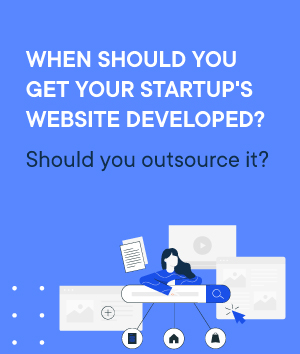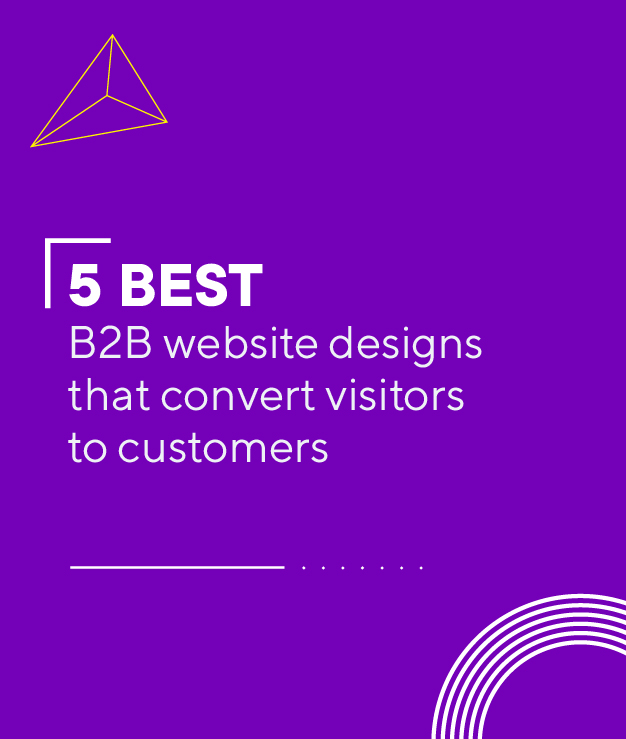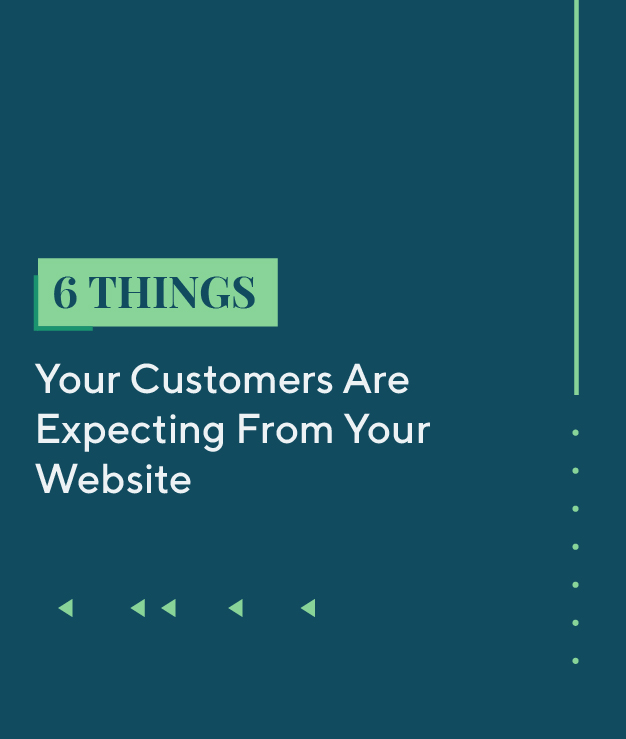How to build a stealth website for your business within 7 days!
Have you been thinking about building a website for your business but find yourself in dire straits? If you don’t know where to start or are not familiar with the process of making a website – don’t worry! This quick guide will help you go live with your stealth website by day 7!
Table of Content:
Day 1: Feature List, Sitemap & Domain
Day 5: Install necessary plugins
Building a website for your business is one of the crucial tasks in order to officiate your brand, run betas/pilots, win over potential customers online and establish your foundation. The same foundation and learnings from it are then used to help your website mature or curve it towards its envisioned stage of a platform.
Which are the two most efficient ways to create a stealth website?
- Go for website builder platforms like Shopify or Wix
- Make one with WordPress – An easy to set up and modify CMS
Undoubtedly, both options are great for new entrepreneurs to take their business online. However, the decision to use WordPress or a website builder ultimately depends on your needs. If you choose a website builder you might just find this guide to be helpful.
In this blog, we’ll walk through the website building process for WordPress – that too within a week! Excited? So are we. In case you get stuck anywhere, you can contact our experts to help you with the process.
Building a website for your business using WordPress within 7 days!
Day 1: Feature List, Sitemap & Domain
The first day is about fleshing out the details and documenting everything. Use this day to straighten out your goals and objectives. Running a website without identifying the goals is like driving a car without knowing the destination. Start off by recognizing your general business goals. Do you want to target revenue? Does your business only look at generating leads through the website? Do you need a portfolio website to just showcase your products or services? Is it a combination of these things?
Don’t forget to check out what your competitors are doing. What can you do better than them on your website? All of the above should help you with building your sitemap. You can’t build a house without a clear blueprint, the same goes for a website!
When you create a sitemap for your website, you’ll be able to answer the following questions:
- How many or what type of pages your website will have
- What content do you need for your website?
- What will the key elements or features that it will have

Once you’re done, the last task for the day will be to decide your website’s name and give it a place to live, a.k.a a domain. Your domain is what somebody types into the bar at the top of a browser to direct to your website – so it isn’t a decision to be taken lightly.
Good domain names are relatively short and easy to remember, type, or say. Since this is how most people will search for you, it should be concise and catchy. In most cases, you have to pay for your domain name annually.
Day 2: Pick a WordPress theme
The second day is when you determine how your website looks. There are hundreds of themes and templates to choose from, pick the one that comes closest to your feature list and matches your expectations in terms of aesthetics.
Whether you’re building an eCommerce site, portfolio page, or blog, there are versatile business themes to suit different business types.
Head to the WP admin dashboard. Find Appearance > Themes.
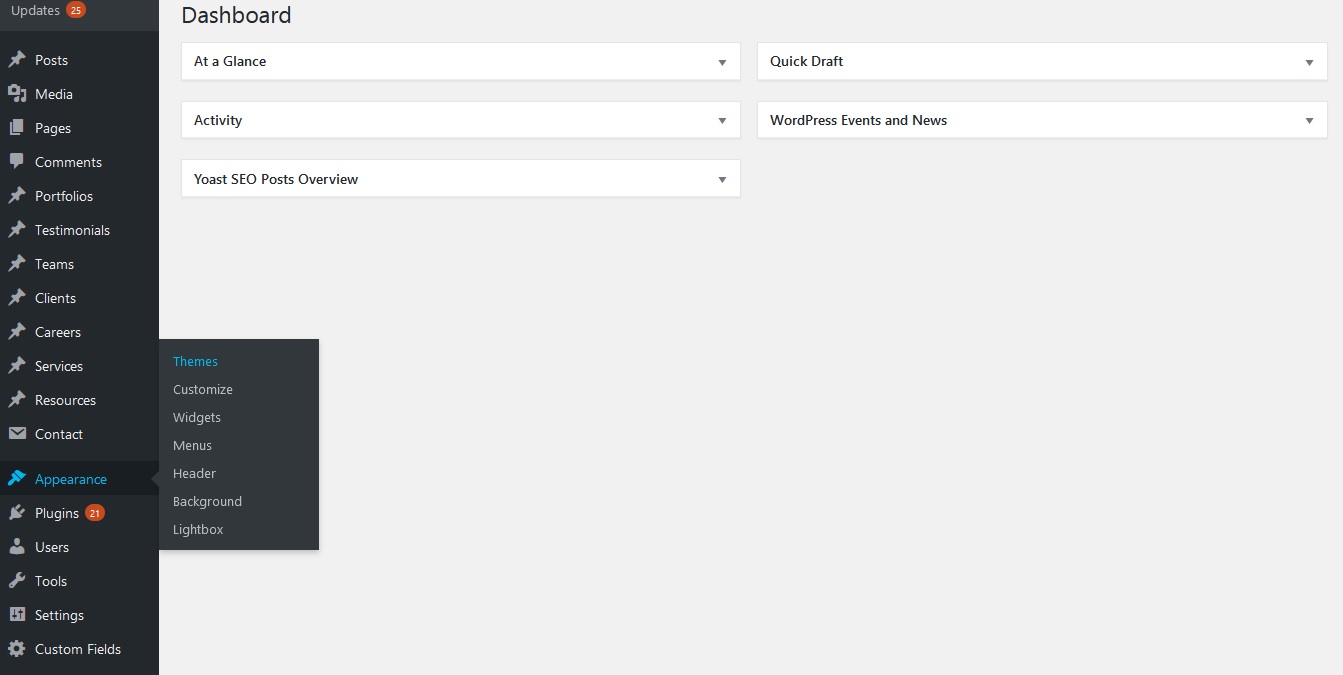
From here you can select or browse through themes and find one that works best for you.
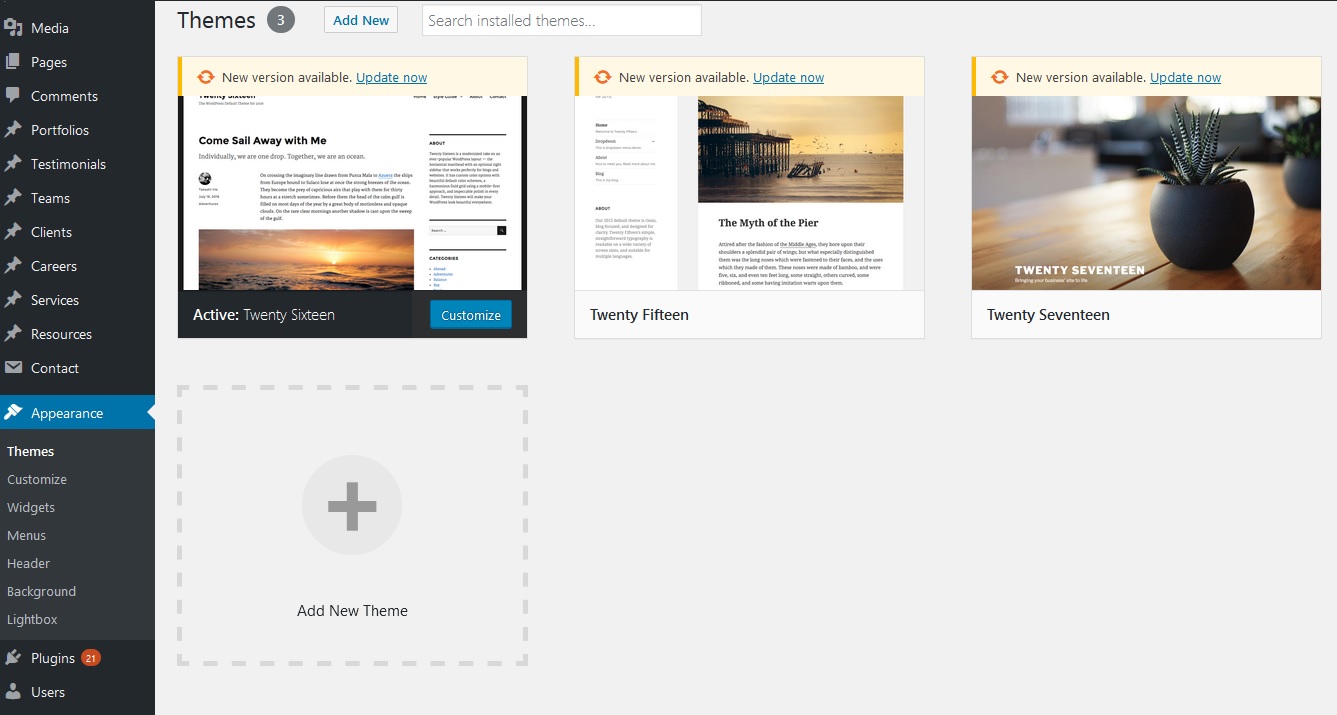
Day 3: Prepare your content
We’re inching closer till you finally get your website live. Now that you’ve installed your desired WordPress theme, it’s time to fill it up with content!
The content on your WordPress website is usually displayed in two main categories:
- Pages
Pages are static, which means the added content stays the same unless you edit them. The “About Us” and the “Contact” page are two common examples. Pages are organized hierarchically on a site – this means you can make one page the “parent” while the other page the “child”. For instance, you might have a parent page called “Fashion”, which is then split into “Women’s Fashion” and “Men’s Fashion”.
To add a new page, go to Pages > Add New.
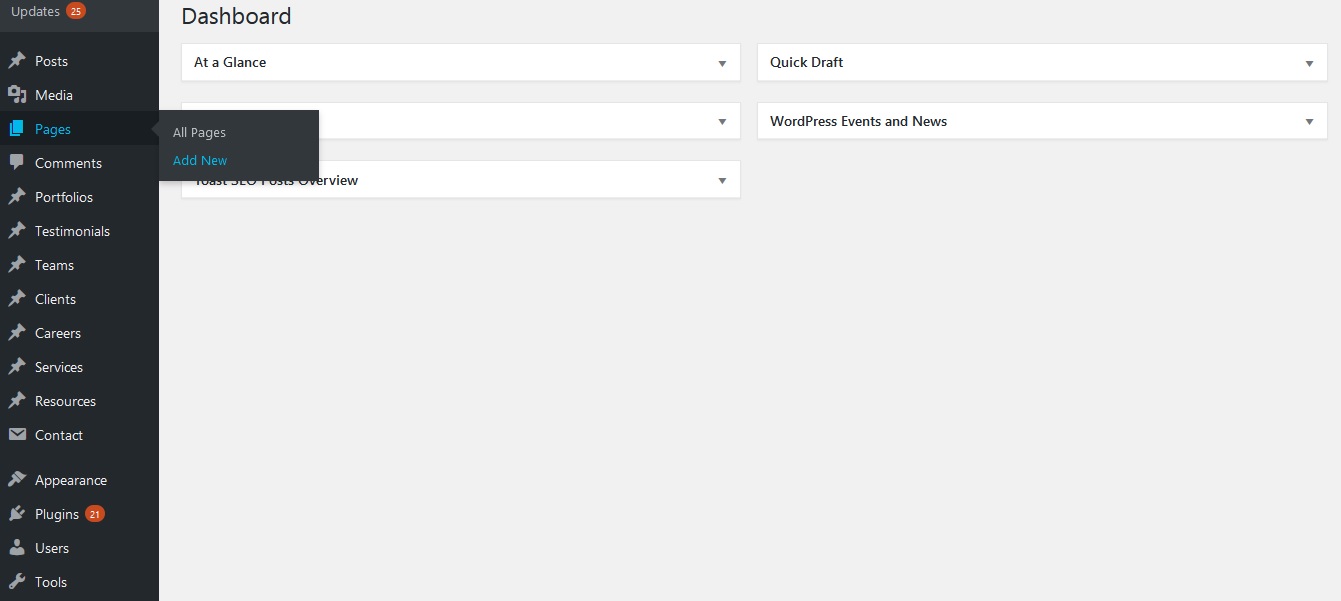
- Posts
Posts are typically designed to be blog entries and portfolios. You can use posts to publish long-form content, news, articles, or other important information that you wish to display on your website.
To add a new post, go to Posts > Add New.
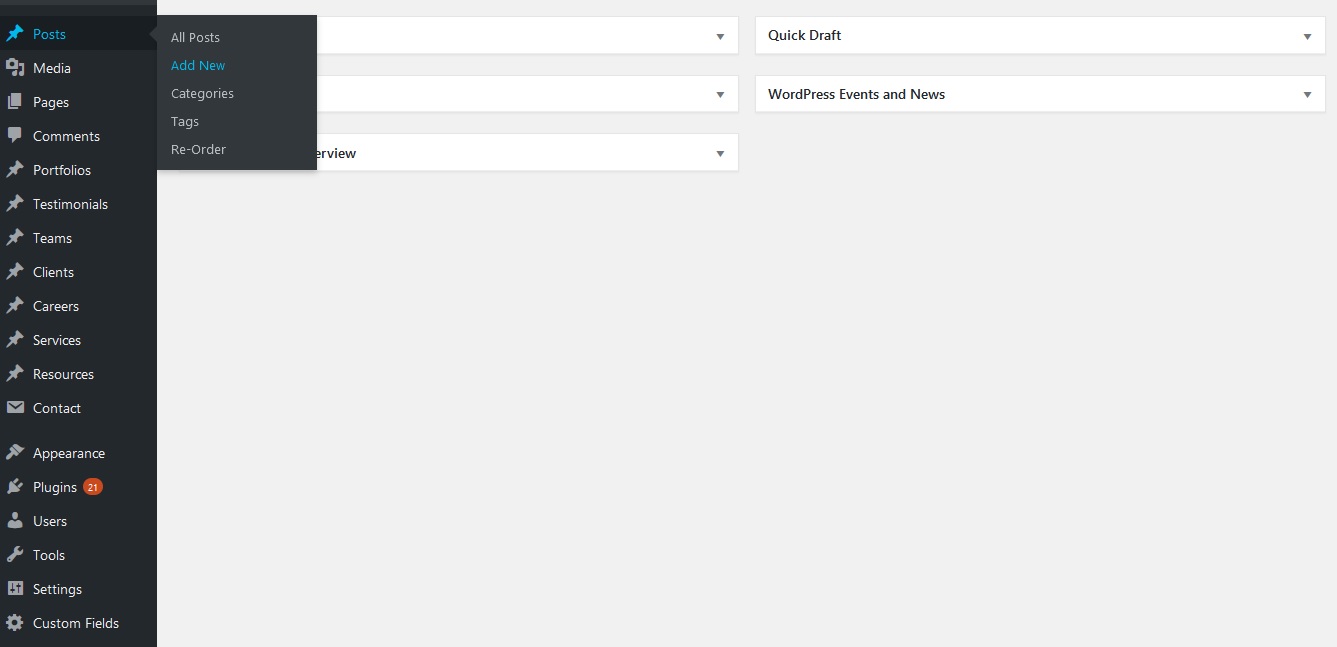
After adding a page or a post, start populating them with your own content and publish them on your WordPress website. The best way to do it is by using ‘Text Blocks’ to add any written content and then embed images or videos in between.
Before hitting the Publish button, make sure you click on Preview to see how it will look on the live site. Once you’re happy with it, hit Publish, or save it as a draft if you want to come back to it later.
Stick to this process till you’ve set up all the pages on your chosen WP theme.
Day 4: Customize your website
With some pages and posts, you’ve added life to your empty website. It’s time to take a step further and start customizing it to match that content. Here are four main ways you can do that:
- Start by your site title: From your admin dashboard, head to ‘Settings’, then click ‘General’. From here add a title for your website.
- Add a navigational menu: Yes your navigational menu can be customized too. Under the ‘Appearance’ section and then go to ‘Menu’. Determine how you want your navigation bar to look and select which pages you’d like to add.
- Set up your homepage: Your homepage can either be a dynamic page with all your featured posts or a static page with the same content. You can set that up by heading to Setting > Reading.
Day 5: Install necessary plugins
Plugins are software additions that improve the functionality of your WordPress website and help you tailor your website user’s experience. There are over 58,000 available plugins – from adding a quick form to set up the website in multiple languages, the WP plugins library is one of the main reasons why businesses worldwide opt-in for it. But 58,000 is a heavy number and can be extremely overwhelming for you. So here are some of the most popular WordPress plugins that are common for most businesses:
- WP Forms – a simple and user-friendly drag and drop’ online form builder plugin to easily customizable forms with just a few clicks.
- Yoast SEO – Yoast SEO is a plugin to help optimize your WordPress posts and pages so that it ranks well on search engines.
- WooCommerce – an easy-to-master WP eComm plugin in case you’re looking to set up your online shop.
- The SEO Framework – helps you master SEO on your new website.
To add these,
Head over to the Plugins section in your admin dashboard to begin the installations. This section shows all your installed plugins. Click on Add New. Pick the plugin that is best for you. Once you have installed a new plugin, you will have to ‘Activate’ it to start using the plugin on your WordPress site.
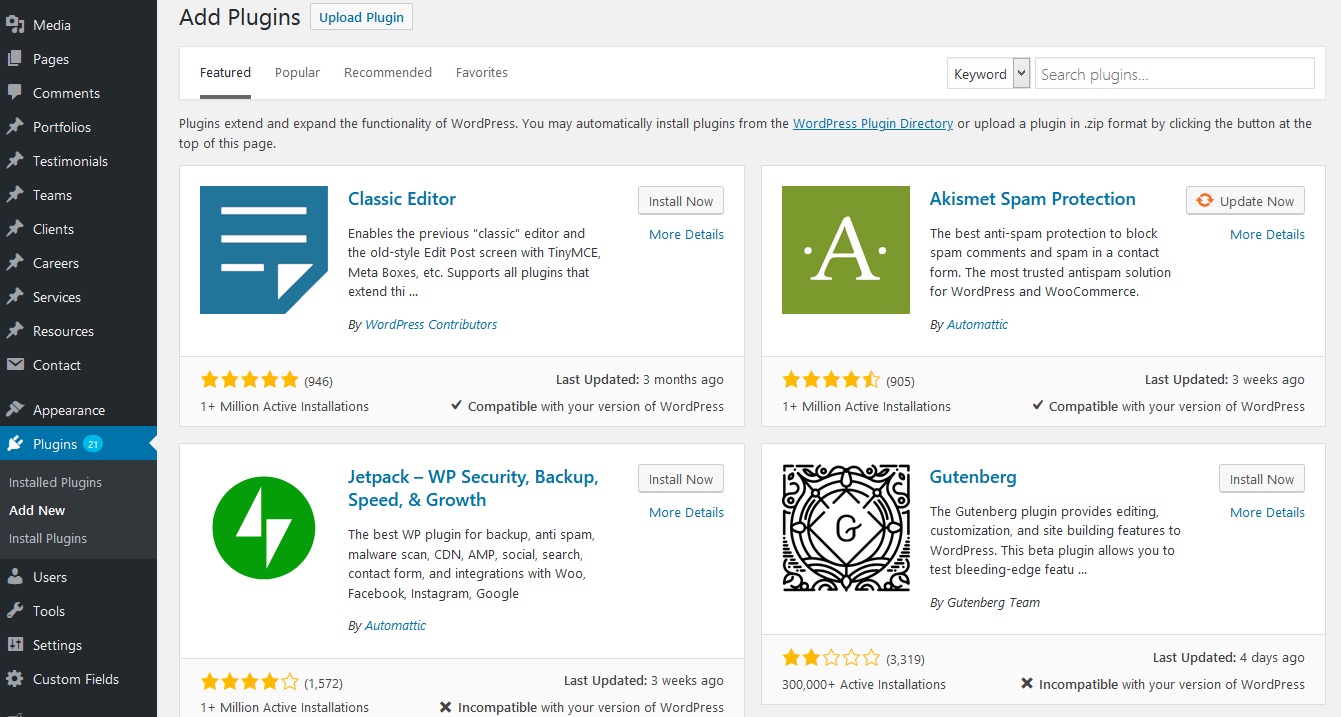
Day 6: Test it out!
A website is never truly ready without a few tests. When working on a website, even the best developers miss out on some minor errors or mistakes. In this situation, it is a good idea to get some outside opinion. We’d advise you to send out your website’s staging or test link to a couple of friends and trusted sources. Ask them to at least spend 10 minutes examining the functions and features of your new website and give their honest feedback. If you want, you can even ask them specific questions so you are able to guide yourself better:
- What does the website tell you about my business?
- Are you smoothly able to navigate through the pages?
- Does the website look like it’s targeted towards my audience?
- What are the things that you think I can do better?
Send out your questions and wait for them to respond back. You can also run a few tests yourself – looking at it from your audience’s eyes and seeing how well the website is performing.
Also, be sure to check how your website looks on different devices and browsers – especially on mobile view since the majority of the global traffic today comes through phones! Consistency is key.
Day 7: Final fixes and LAUNCH
You’ve reached the seventh day – how proud are you of yourself? By this time, you may have received the feedback as well. Take the day to work on incorporating that feedback – from arranging the background image to fixing some small grammatical errors. This is your chance to nail everything on your site before you finally launch it!
Once you’re done refining and modifying the essentials, it’s time to have a final look and a final proofread of all your content! Make sure you’re satisfied with the end result and if you are – good job! You’ve made it. But your job isn’t done here. When you are building a website for a business, you’re also responsible for putting the word out there about your newly launched website – whether through social media, word of mouth, email marketing, paid promotion, or all these ways. Just make sure you keep a track of the website traffic, what’s working and what’s not working, new features your customers suggest, your ideas on evolving the website – all this will help in launching the 2nd, more optimized build of your website!
The most amazing thing about building a website for a business is that you did it all by yourself. While setting up the stealth website can be achieved, don’t forget the grander vision you have for it. With time, your website will mature with newer features and functions. Build something that doesn’t need to be relooked in 3 years and costs you a fortune. Anticipate the expansion of your brand and your requirements for it through the website. Build it today while thinking of your brand’s tomorrow! Our in-house team makes and develops WP custom websites that are tailored for users.
Thinking about building a website for your business? How about a free discovery session with our experts? The coffee’s on us!
